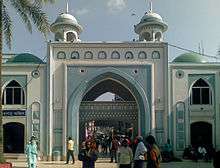Sareqaum
The Sareqaum family (Bengali: সরেকওম খানদান, Persian: سرقوم خاندان) are a notable family of the Sylhet region who are mutawallis and khadims of the dargah of Shah Jalal. They are the only family who hold this title.[1]
| Sareqaum family সরেকওম খানদান | |
|---|---|
| Current region | Sylhet, Bangladesh |
| Earlier spellings | সরকওম |
| Etymology | Head (Sar) of the people (qaum) |
| Founder | Haji Muhammad Yusuf |
| Religion | Sunni Islam |
| Estate(s) | Sareqaum House, Dargah-e-Shah Jalal, Sylhet |

History
তুমি চলে গেছ দূরে আসিবেনা কভু, তোমারে খুঁজিয়া আঁখি ফিরিতেছে তবু
Tumi chole gechho doore aashibena kobhu, Tomare khujiya ankhi phiritechhe tobu
তোমার আমার মাঝে হয়েছিল যত কথা বলা, রেশটুকু আজো প্রাণে দেয় আসি দোলা
Tomar amar majhe hoyechhilo joto kotha bola, Reshtuku aajo praane dey aashi dola
সকারে, দুপুরে, সাঁঝে, নব বরষায়, যত কথা হয়েছিল তোমার আমায়
Shokare, dupure, shanjhe, nobo boroshay, Joto kotha hoyechhilo tomar amay
তাহার প্রতিটি কথা প্রতিটি চাহনি আঁধারে কাহারে খুঁজে জানিগো জানি
Tahar protiti kotha protiti chahoni, aandhare kahare khuje janigo jani
প্রতিটি নিঃশ্বাস তব এতটুকু হাসি, প্রতিদিন একই কথা তোরে ভালবাসি
Protiti nishaash tobo etotuku hashi, protidin eki kotha tore bhalobashi
তোরে ভালবাসি আমি জীবনে মরণে, জনমে জনমে মোর অবসর ক্ষণে
Tore bhalobashi ami jibone morone, jonome jonome more oboshor kkhone
– A poem written by Moulvi Sareqaum Ubaydullah.[2]
Following the Conquest of Sylhet in 1303, Haji Yusuf remained in Chowkidighi alongside Shah Jalal. At Jalal's instruction, Yusuf married a native Bengali Muslim woman. Before dying on 15 March 1346, Jalal appointed Yusuf to be the mutawalli (guardian) of his waqf, which consisted of his mosque and future grave. Yusuf was given the title of Sar-e-Qaum (head of the people) and his descendants, the Sareqaum family, continue to hold this role. One of his closest companions, Yusuf was buried southeast of Jalal's tomb after his own death.
Faujdar of Sylhet, Isfandiyar Khan Beg officially recognised the inauguration of Shaykh Sareqaum Pir Bakhsh as the rightful guardian of Shah Jalal's dargah in the 1660s. Khan built a mosque near the dargah and the ruins of this incomplete mosque can be seen today, behind the trees near the Dargah Gateway.[3]
A Jalsa-house was established in the Mughal era and to the west of this house remains the graves of the Mutawallis Sareqaum Abu Nasr and Sareqaum Abu Nasir. Sareqaum Abu Turab Abd Al-Wahhab is buried near Shah Jalal.
On 16 September 1936, Bengali Muslim litterateurs, gathered at the Sareqaum House where they established the well-known literary society known as the Sylhet Central Muslim Literary Society (later branching out to become the Kendriya Muslim Sahitya Sangsad). One of the oldest literary societies in Bangladesh, its inaugural secretary was Sareqaum Abu Zafar Abdullah, a well-known Bengali writer and the Mutawalli of Shah Jalal's dargah.[4] Other members of this society included Muhammad Nurul Haque and Syed Abdul Majid. Many of Abdullah's works were published in the popular newspapers of those times.[5] His most famous work was Shaptak.[6] The Sangsad as well its Al-Islah magazine were based in Abdullah's property.[7] He was key activist during the Pakistan Movement.[8] Abdullah's maternal cousin was the historian Nasiruddin Ahmad Chowdhury.[9] In 1971, Abdullah started the construction of a minaret (with a clock) in the dargah complex which was completed a few days after the Independence of Bangladesh.
Moulvi Sareqaum Ubaydullah was a poet who famously wrote the Rakhaliya Bashi. From 1942, he was a member of the Sangsad. He hosted Kazi Nazrul Islam during the his visit to the Sylhet region.[10]
The Mutawalli Sareqaum Yusuf Amanullah, son of Abu Zafar Abdullah, was vice-president of the Sangsad from 1988 to 1990. In 1996, Sareqaum Ikramullah was a sponsor of the Sangsad. Amanullah died in 2013 at the age of 76 years due to illness. He had one son and four daughters, and the Prime Minister of Bangladesh Sheikh Hasina paid her respects.[11] His successor was his son, Sareqaum Fatehullah Al-Aman.[12] In the same year, the Khadim Sareqaum Yunus Ayatullah died.[13] Sareqaum Khaled Ahmed was a director for the British Bangladesh Chamber of Commerce.[14]
See also
References
- Mehedi, Ujjol (26 May 2018). "এক কাতারে, এক আহারে". Prothom Alo.
- Khatun Chowdhuri, Rabeya (1993). Sileter Kabyo Sadhon (in Bengali). pp. 175–176.
- Chowdhury, Mujibur Rahman (2 Oct 2019). "গৌড়-বঙ্গে মুসলিম বিজয় এবং সুফি-সাধকদের কথা". Sylheter Dak.
- Sharma, Nandalal. "Kendriyo Muslim Sahitya Sangsad". Banglapedia: National Encyclopedia of Bangladesh. Asiatic Society of Bangladesh.
- Taher, Syed Muhammad. Sareqaum Abu Zafar Abdullah: Jibon O Kormo (in Bengali).
- Husayn, Muhammad Ashraf (1990). Silhater Itihas (in Bengali). 1. Mahmud Ahsan Choudhury.
- Jibani Granthamala (in Bengali). 166. Bangla Academy. 1993. pp. 15–20.
- Raziuddin Qurayshi (30 Apr 2019). "একটি বিবৃতি ও একটি সংগঠন". Daily Naya Diganta (in Bengali).
- Rafiqur Rahman Loju (31 Aug 2019). "ইতিহাস বিষয়ক একটি গ্রন্থের কথা". Sylheter Dak.
- Chowdhury, Husayn Tawfiq (25 May 2019). "সিলেটে নজরুল". Sylheter Dak (in Bengali).
- "হযরত শাহজালাল (রহঃ) দরগাহের মোতাওয়াল্লির ইন্তেকাল". The Daily Ittefaq. April 2013.
- "শাহজালাল (রহ.) মাজারে ওরশ শনিবার শুরু" (in Bengali). Kaler Kantho. 9 Aug 2017.
- Ariful Haque Choudhury (24 Aug 2014). "সিলেট সিটি কর্পোরেশন বাজেট ২০১৪-২০১৫". Sylhet City Corporation (in Bengali).
- "ব্রিটিশ-বাংলাদেশ চেম্বার অব কমার্স এন্ড ইন্ড্রাষ্টি'র এ্যাপ লঞ্চিং". LondonBDNews24 (in Bengali). 16 Jun 2015.